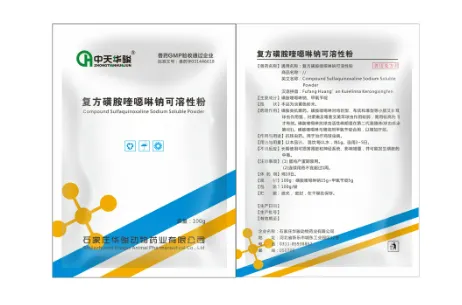
4-р сар . 25, 2025 15:57 Жагсаалт руу буцах
How Vaccines Are Revolutionizing Animal Healthcare
Vaccination has transformed the way we protect animals from diseases, improving their health and increasing productivity. Whether it's poultry drugs, livestock drugs, or general farm animal drugs, vaccines play a crucial role in disease prevention. As the demand for high-quality animal products grows, animal drugs like vaccines have become an essential part of modern farming.

The Role of Animal Drugs in Preventing Livestock Diseases
Farm animals are constantly exposed to various infectious diseases that can spread rapidly if not controlled. Vaccination is a cost-effective way to prevent outbreaks and ensure the overall well-being of livestock.
Key Benefits of Vaccination in Livestock:
- Prevents Disease Outbreaks– Reduces the spread of contagious infections.
- Enhances Animal Growth– Keeps animals healthy for better weight gain and productivity.
- Reduces Antibiotic Use– Decreases the need for excessive livestock drugs by preventing infections.
- Improves Farm Profits– Fewer sick animals mean lower veterinary costs and higher yields.
From foot-and-mouth disease in cattle to avian influenza in poultry, vaccines help farmers maintain healthy herds and flocks.
Poultry Vaccines: A Game-Changer for Poultry Farming
Poultry farming is a vital industry worldwide, but diseases like Newcastle disease, Marek’s disease, and infectious bronchitis can devastate entire flocks. Vaccination has revolutionized poultry healthcare by providing effective protection.
Why Vaccination is Essential for Poultry:
- Protects Against Deadly Diseases– Prevents mass poultry losses.
- Boosts Egg Production– Healthy birds lay more eggs.
- Ensures Safe Meat Supply– Prevents disease contamination in poultry products.
- Reduces Dependency on Medications– Limits the use of antibiotics and other poultry drugs.
Regular vaccination schedules ensure strong immunity, keeping poultry farms productive and profitable.
How Animal Drugs Improve the Health of Farm Animals
Vaccines are not limited to poultry and livestock; they are essential for all farm animal drugs, including swine, goats, and sheep. They help prevent bacterial, viral, and parasitic infections, ensuring a safer food supply.
Most Common Vaccines for Farm Animals:
- Swine Fever Vaccine– Protects pigs from fatal viral infections.
- Rabies Vaccine– Essential for farm animals in contact with wild species.
- Clostridial Vaccine– Prevents deadly bacterial diseases in cattle and sheep.
- Brucellosis Vaccine– Protects livestock from reproductive disorders.
By using vaccines alongside other farm animal drugs, farmers can keep their animals in peak condition and avoid costly disease outbreaks.
Future of Animal Drugs in Animal Healthcare
Advancements in vaccine technology are leading to new and improved disease prevention strategies. With the rise of biotechnology, vaccines are becoming more targeted, effective, and easier to administer.
Upcoming Innovations in Animal Vaccination:
- Oral Vaccines– Easier administration without the need for injections.
- Genetically Engineered Vaccines– More precise protection against specific diseases.
- Combination Vaccines– Protects animals from multiple diseases in a single shot.
- Nanotechnology in Vaccines– Enhances immune response with minimal side effects.
As the global demand for safe and sustainable farming grows, vaccines will continue to be a key component in animal drugs, ensuring the health and productivity of farm animals.
How Vaccines Are Revolutionizing Animal Healthcare FAQs
Why are vaccines important for farm animals?
Vaccines prevent the spread of infectious diseases, improve animal health, and reduce the need for antibiotics and other farm animal drugs.
Do poultry vaccines have side effects?
Most poultry vaccines are safe and have minimal side effects, such as mild swelling or temporary loss of appetite.
How often should livestock be vaccinated?
Vaccination schedules vary depending on the animal species and disease risks. Farmers should follow veterinary guidelines for the best results.
Can vaccines replace antibiotics in animal healthcare?
Vaccines reduce the need for antibiotics by preventing diseases before they occur, but some infections still require treatment with livestock drugs.
Where can I buy vaccines and animal drugs?
Vaccines and animal drugs can be purchased from veterinary suppliers, online distributors, and agricultural stores. Always ensure products come from a trusted source.
Vaccination is revolutionizing animal healthcare by providing safe, effective, and long-term disease prevention. Whether you are managing a poultry farm or raising cattle, investing in vaccines will protect your animals, boost productivity, and ensure a healthier future for farming!
-
When to Use Aquarium Medication for Sick Fish
МэдээJul.28,2025
-
The Importance of Balanced Pet Nutrition
МэдээJul.28,2025
-
How to Administer Pet Dewormer Safely
МэдээJul.28,2025
-
Essential Poultry Drugs for Chicken Farmers
МэдээJul.28,2025
-
Common Dog Ear Problems and Treatments
МэдээJul.28,2025
-
Best Anti Parasitic Medicine for Intestinal Parasites
МэдээJul.28,2025




